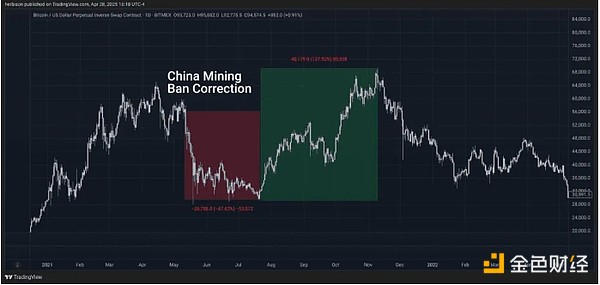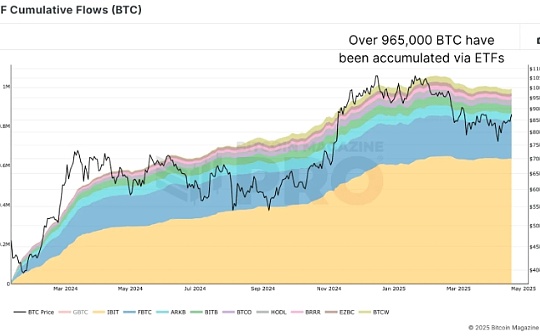Is the centralization of Bitcoin mining in the United States a new risk in the industry?

Reprinted from jinse
04/29/2025·13DSource: Bitcoin Magazine; Translated by: Baishui, Golden Finance
A pioneering study by the Cambridge Center for Alternative Finance (CCAF) shows that the United States currently dominates the Bitcoin mining market, controlling up to 75.4% of global hash computing power. "The United States has consolidated its position as the world's largest mining center (75.4% of reported activity)," the CCAF report said. The report is based on a survey of 49 mining companies that account for nearly half of the hash power of the Bitcoin network.
This concentration is equivalent to about 600 EH/s in the global computing power of 796 Ahash/s (EH/s), which raises an urgent concern: Is Bitcoin mining over-concentrating in the United States? What risks will this bring to the future of this emerging asset?
Howard Lutnick, the U.S. Secretary of Commerce and former CEO of Cantor Fitzgerald, recently shared his insights on the Trump administration’s vision to position the United States as a Bitcoin superpower. “To me, it’s like gold, a commodity,” Lutnik said in an interview with Frank Kova of Bitcoin Magazine, highlighting the fixed supply of 21 million bitcoins. He outlined plans to “accelerate” U.S. mining through the U.S. Department of Commerce’s investment accelerator project, which simplifies the licensing process for miners to build off-grid power plants. "You can build your own power plant next to [your data center]. I mean, think about it," he said.
This pro-business stance has driven the mining boom in the United States, but the CCAF's findings also reveal one drawback: centralization. For years, Bitcoin enthusiasts have been worried about China's dominance, and China's share of global computing power peaked at 65-75% before the mining ban was implemented in June 2021. A 2025 study by Nature Communications pointed out: "In 2019, China dominated global Bitcoin mining, accounting for 65-75% of the total computing power of the Bitcoin network." When China banned mining, computing power was dispersed around the world, and many mines moved to the United States, attracted by states with sufficient energy and preferential policies. This shift caused a 50% correction in the market, but also paved the way for a 130% increase at the end of the year and demonstrated the market's resilience.

Although the concentration of computing power in Chinese history has never led to network abuse, this has always been a worrying issue. Nowadays, since the United States has 75% of its computing power, similar risks have also emerged. The Trump administration is friendly to Bitcoin, but future governments may become hostile, using centralized computing power to control the network. Unlike China's ban, the future U.S. government may try to regulate or manipulate mining, using administrative powers such as sanctions to review transactions - and the centralization of mining has exacerbated this threat.
The federal system in the United States provides a potential guarantee. The division of power between state and federal governments can effectively resist excessive federal intervention. In states where mining activity is active, officials and the public may think that manipulating the industry will damage the value of Bitcoin, thus affecting investors. This resistance can maintain the integrity of the network.
The weakening of the US monetary sanctions system may be in our favor. Following the seizure of Russian government bonds in 2022, some countries that are inconsistent with U.S. policies have reduced purchases of U.S. bonds, weakening the track of abused fiat currencies in sanctions. The Trump administration is turning to controlling goods rather than money flows through tariffs, which may reduce the threat of monetary censorship. This transformation has won time for Bitcoin, as centralized computing power can easily become a soft target for federal intervention.
Nevertheless, American Bitcoin enthusiasts must remain proactive. Deepening the popularity of Bitcoin, which makes it widely integrated into the economy and the global world, can prevent censorship because attacks on the network can damage personal wealth and spark strong opposition. History also shows that miners will adapt when forced to be displaced – a ban in China proves this – but the government will learn from the lessons. The future U.S. government may not ban mining, but try to control it and take advantage of centralization.
The Bitcoin industry is facing a critical moment. The United States has up to 75.4% of computing power, and even estimates as low as 50% mean huge centralized risks. Should we diversify globally or rely on the US mining dominance? As Lutnick's vision is gradually realized, Bitcoin fans must ensure that this sovereign currency remains resilient no matter who is in power.



 panewslab
panewslab